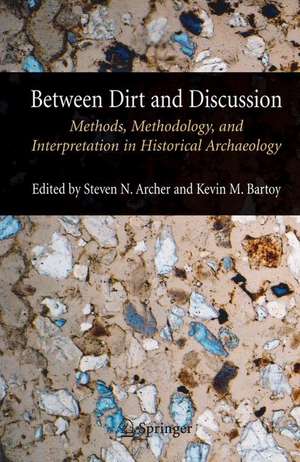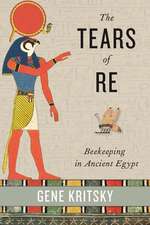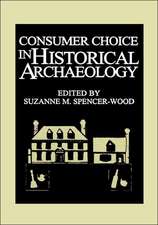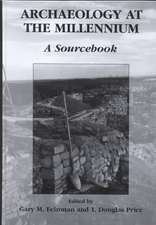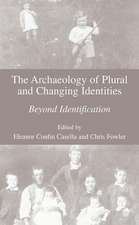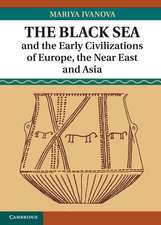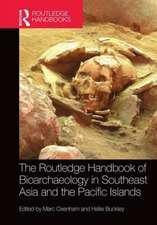Between Dirt and Discussion: Methods, Methodology and Interpretation in Historical Archaeology
Editat de Steven Archer, Kevin Bartoyen Limba Engleză Hardback – 14 sep 2006
Exploring how data is generated and interpreted by historical archaeologists, it is at the intersection of "dirt and discussion". The cases presented in this volume revisit old methods and previous scholarly approaches with new perspectives, along with incorporating the newest technologies available to understanding the past. Rethinking the classics and engaging with new modes of data creation also generate fresh theoretical approaches.
Using their own work as examples, the contributors explore the connections between methodology and interpretation. Between Dirt and Discussion advocates recentering the materials that make archaeology archaeology, in the hopes of reinvigorating dialogues about the historic past, and archaeological contributions to its understanding.
Toate formatele și edițiile
| Toate formatele și edițiile | Preț | Express |
|---|---|---|
| Paperback (1) | 386.22 lei 6-8 săpt. | |
| Springer Us – 29 oct 2010 | 386.22 lei 6-8 săpt. | |
| Hardback (1) | 392.97 lei 6-8 săpt. | |
| Springer Us – 14 sep 2006 | 392.97 lei 6-8 săpt. |
Preț: 392.97 lei
Nou
Puncte Express: 589
Preț estimativ în valută:
75.19€ • 81.94$ • 63.36£
75.19€ • 81.94$ • 63.36£
Carte tipărită la comandă
Livrare economică 24 aprilie-08 mai
Preluare comenzi: 021 569.72.76
Specificații
ISBN-13: 9780387342184
ISBN-10: 0387342184
Pagini: 222
Ilustrații: XIV, 222 p.
Dimensiuni: 155 x 235 x 16 mm
Greutate: 0.53 kg
Ediția:2006
Editura: Springer Us
Colecția Springer
Locul publicării:New York, NY, United States
ISBN-10: 0387342184
Pagini: 222
Ilustrații: XIV, 222 p.
Dimensiuni: 155 x 235 x 16 mm
Greutate: 0.53 kg
Ediția:2006
Editura: Springer Us
Colecția Springer
Locul publicării:New York, NY, United States
Public țintă
Professional/practitionerCuprins
Introduction: Considering Methods and Methodology in Historical Archaeology.- Pipemakers and Their Workshops: The Use of Geochemical Analysis in the Study of the Clay Tobacco Pipe Industry.- The Integration of Historical Cartographic Data Within the GIS Environment.- Saloons in the Wild West and Taverns in Mesopotamia: Explorations along the Timeline of Public Drinking.- The Life and Death of a Home: House History in a Subsurface Feature.- Alternatives to Traditional Models for the Classification and Analysis of Pipes of the Early Colonial Chesapeake.- Archaeology and the Ethics of Scientific Destruction.- Finding Common Ground in Common Places: Interdisciplinary Methods for Analyzing Historic Architecture on Archaeological Sites.- Re-excavation, Reflexivity and Responsibility at Colonial Williamsburg: The Archaeology of Archaeology and the Reifnement of Site Interpretation.- Excavating Sites Unseen: The Example of Earthfast Buildings in the Colonial Chesapeake.- 'Ponying up to Billy Hurst's Saloon': The Testing and Evaluation of Nineteenth- and Twentieth-Century Archaeological Deposits Through Less Invasive Techniques in Yosemite National Park.- Methodology, Materiality and the Endless Sea of Archaeology.-
Recenzii
From the reviews:
"Anthropologists and related scientists look at what is necessary between digging up artifacts from historical periods and presenting findings to a conference.They do not champion some interpretive methodologies over others, but evaluate and critique methods they use themselves or have seen others use, with a goal of improving their internal consistency or their connection with larger theoretical and methodological contexts." (February 2007 Reference & Research Book News)
"The papers within the volume edited by Archer and Bartoy reveal how historical archaeologists are continuing to develop methodologies which allow data to be collected and analysed on a range of scales. … Many of the methodological concerns explored here would also apply to other periods, and this is a book that should be examined in the library by many … ." (Harold Mytum, Antiquity, Vol. 82, 2008)
"Anthropologists and related scientists look at what is necessary between digging up artifacts from historical periods and presenting findings to a conference.They do not champion some interpretive methodologies over others, but evaluate and critique methods they use themselves or have seen others use, with a goal of improving their internal consistency or their connection with larger theoretical and methodological contexts." (February 2007 Reference & Research Book News)
"The papers within the volume edited by Archer and Bartoy reveal how historical archaeologists are continuing to develop methodologies which allow data to be collected and analysed on a range of scales. … Many of the methodological concerns explored here would also apply to other periods, and this is a book that should be examined in the library by many … ." (Harold Mytum, Antiquity, Vol. 82, 2008)
Textul de pe ultima copertă
Interpretations of the past are under constant critical scrutiny in archaeology. In recent decades, theoretical views have profoundly changed the conceptions of both "the past" and archaeologists' relationship to this object of study. However, our basic excavation and analytical methods have undergone little critical re-evaluation. Often archaeological discussions begin as if "data" were already established, independent of the research designs and analytical choices that produce them. Interpretation often ends at the lectern, but it has many beginnings within the traditional archaeological process.
Exploring how data is generated and interpreted by historical archaeologists, it is at the intersection of "dirt and discussion". The cases presented in this volume revisit old methods and previous scholarly approaches with new perspectives, along with incorporating the newest technologies available to understanding the past. Rethinking the classics and engaging with new modes of data creation also generate fresh theoretical approaches.
Using their own work as examples, the contributors explore the connections between methodology and interpretation. Between Dirt and Discussion advocates recentering the materials that make archaeology archaeology, in the hopes of reinvigorating dialogues about the historic past, and archaeological contributions to its understanding.
Exploring how data is generated and interpreted by historical archaeologists, it is at the intersection of "dirt and discussion". The cases presented in this volume revisit old methods and previous scholarly approaches with new perspectives, along with incorporating the newest technologies available to understanding the past. Rethinking the classics and engaging with new modes of data creation also generate fresh theoretical approaches.
Using their own work as examples, the contributors explore the connections between methodology and interpretation. Between Dirt and Discussion advocates recentering the materials that make archaeology archaeology, in the hopes of reinvigorating dialogues about the historic past, and archaeological contributions to its understanding.
Caracteristici
This work is in keeping with both theoretical archaeology as well as historical archaeology The mix of "established" and newer contributors will be of interest to the older and younger communities in historical archaeology Represents a holistic approach to archaeological methodology "between dirt and discussion." The contributors primarily use case studies to explore the intersections between methodology and interpretation This emphasis and explanation and application will allow for increased dialogues beyond the individual contribution and encourage future applications and critical reappraisals of a variety of archaeological methods Includes supplementary material: sn.pub/extras
